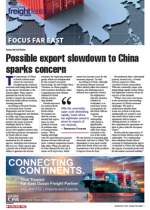A r ising level of engagement is highlighting the growing relations between Africa and the Association of Southeast Asian Nations (Asean). Key events, such as Indonesian President Joko Widodo's extensive African tour earlier this year and the recent Singapore-Africa Business Forum, underscore the increasing importance of these regions' economic ties. This renewed collaboration is driven by a shared understanding that, as traditional economic powerhouses like China and Europe face slowdowns, the future lies in exploring the vast potential offered by Africa and the Asean.During a recent episode of the ‘China in Africa’ podcast, Cobus van Staden, the managing editor of China Global South, emphasised the significant synergy between Africa and the Asean. He pointed out that, much like Africa, the Asean was a diverse region with a complex colonial history, encompassing a variety of cultures and religions. Africa can learn valuable lessons from the Asean’s successful economic integration and closely knit cooperation. “South African produce exporters are increasingly leaning into trade with the Asean. With trade with Russia evaporating, producers have been actively looking at markets beyond Russia and China.”Singapore trade surge As interest in the Asean continues to rise, not only in South Africa but throughout Africa, it is crucial to acknowledge the significant role of Singapore in expanding its trade relations with Africa. In the past year, the total trade between Singapore and Africa surged to $20 billion, a remarkable feat given Singapore's relatively modest population of around 5.5 million people. It's important to clarify that Singapore primarily functions as a transhipment hub, which means that not all of this trade revenue is destined for the country itself. Nevertheless, this figure underscores the pivotal role Singapore plays in facilitating trade between the Asean and Africa.Singapore is further solidifying its dedication to Africa through continuous foreign direct investments, which are currently estimated to range from $20 to $30bn. One noteworthy example of Singapore's commitment is its significant involvement in financing the construction of the new port in Leki, Nigeria. While Singapore's investments in Africa may not have garnered as much attention as those from China, it's evident that the country is actively engaging in substantial infrastructure projects across the continent, placing it in the same league as major contributors to Africa's development.Manufacturing hub According to Amit Jain, the director of the Centre for African Studies at Nanyang Technological University, Southeast Asian investors are increasingly exploring the opportunities presented by Africa. He notes that countries are also considering Africa's potential as a manufacturing hub. “In the past, countries like Vietnam and Cambodia had significantly cheaper labour than countries like Ghana. However, the wage gap is narrowing, making it increasingly feasible to establish manufacturing hubs in West Africa. Additionally, Africa now boasts special economic zones, attracting active interest from Southeast Asian nations keen on establishing their manufacturing centres on the continent.”Standard Chartered Africa and Middle East's research on thriving trade routes has revealed promising long-term prospects for companies willing to explore opportunities in the Asean and Africa. According to the bank's projections, trade expansion between these regions is expected to surpass the average global annual growth rate by 2030. The Asean is consistently viewed as a gateway for African companies to access Eastern markets, and considering the global shift in trade towards Asia, it makes practical business sense to prioritise and enhance trade activities in this region.

